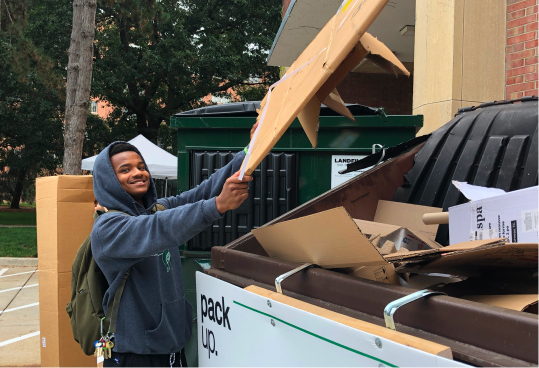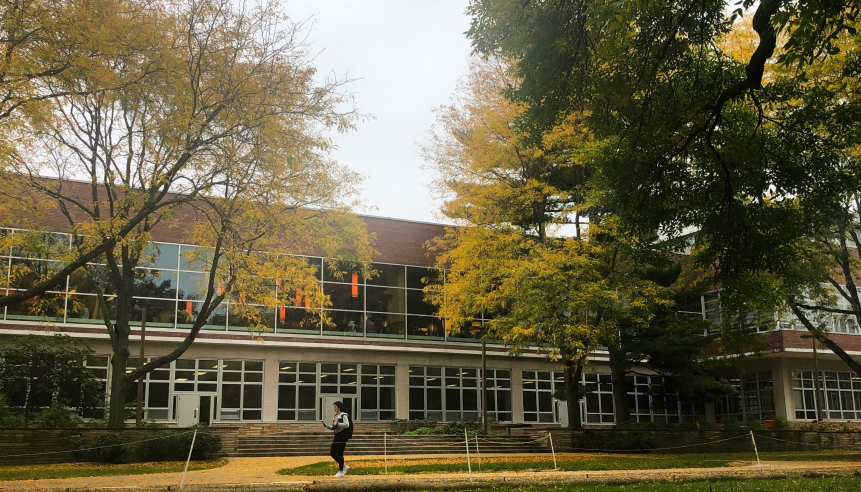Reaching first across Michigan and then extending globally, MSU has made long-standing commitments and progress in sustainability as a global leader through cutting-edge research, experiential learning, community engagement, and improving sustainable operations. The university remains steadfast in its commitment to achieve a just and sustainable future, with stewardship and sustainability a key focus of the MSU 2030 strategic plan.
The Michigan State University Office of Sustainability, part of the Executive Vice President for Administration’s portfolio, serves as an enterprise resource and convener for advancing sustainability across the university. The office develops strategies to meet institutional goals and foster a sustainable institution in collaboration with campus partners, tracks and reports progress on university sustainability goals, coordinates programs to help Spartans embrace sustainable actions, supports students in pursuing interests related to sustainability, and connects with sustainability leaders in regional, statewide, and national networks.
Sustainability Framework
MSU has adopted a sustainability framework that aligns with its strategic goals and embeds a systems approach to meeting the mission of advancing knowledge and transforming lives. Utilizing the four pillars of success: campus, curriculum, community, and culture, MSU continues to move forward in meeting energy goals and reducing greenhouse gas emissions, while also taking systemic sustainable actions and adopting a culture that enables the institution to reach those goals.
Utilizing the framework of its four pillars of success: campus; curriculum; community and culture, the university cultivates and embeds cross functional and multi-disciplinary collaborations across the colleges, divisions, departments and community partners.
Campus - Create a Smart Campus for a just transition to a sustainable future
The MSU campus buzzes with ideas, energy, purpose and possibility. The place Spartans call home on the banks of the Red Cedar River is not only a world class academic institution, but also a place where a series of sustainable systems are operating to make the institution more efficient every day. From energy, biodiversity, and operational technologies, to building standards, procurement, and transportation, a sustainable smart campus is key to powering the academic enterprise and sustainable business operations. The university’s extensive infrastructure also creates opportunities for experiential learning and using the campus as a living laboratory.
Curriculum - Invest in sustainable scholarship, cooperative education and research innovation
MSU provides life-changing opportunities to a diverse and inclusive academic community and pushes the boundaries of discovery to solve the most pressing global challenges. Every day, researchers are engaging in cutting-edge and world-class scholarship that will help foster a sustainable future. With over 600 courses that incorporate sustainability and sustainable development goals into the curriculum, ample experiential learning opportunities, and continuing education, MSU is developing life-long learners with the capacity to accomplish positive change in the world. As a premier land grant institution, MSU also provides knowledge resources directly to individuals, communities, and businesses throughout the state.
Community - Serve as a global leader in sustainability and climate change
MSU reaches globally in its impact and drives sustainable change within its own campus and beyond through collaborative, participatory, and transformative partnerships. Community-based partnerships are embedded throughout the fabric of the University and advance MSU’s land-grant mission by connecting university capacity with community knowledge in mutually beneficial ways.
Culture - Embed a sustainable culture throughout the university
Every person has a role in advancing sustainable principles in their daily actions both on and off campus. To adopt a strong sustainability culture requires the university to empower and recognize their contributions and create an atmosphere encouraging innovation. Higher education opens doors to opportunities that create a more equitable world, and MSU’s doors are open with affordable programs accessible to all. MSU has continued to push itself past its own limits to promote a culture of sustainability and accommodate campus diversity, equity, and employee satisfaction.

